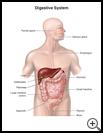
H. Pylori Infection
________________________________________________________________________
KEY POINTS
- H. pylori are bacteria that can cause stomach irritation, heartburn, nausea, bloating, and ulcers in your stomach and intestine.
- If you have stomach symptoms and H. pylori, treatment may include medicines to treat the infection, to decrease the acid in your stomach, or to coat and protect your stomach lining.
- Ask your healthcare provider how to take care of yourself at home, what symptoms or problems you should watch for, and what to do if you have them.
________________________________________________________________________
What is H. pylori?
H. pylori are bacteria that can cause stomach irritation (gastritis), heartburn, nausea, and bloating. H. pylori can also cause raw places or sores called ulcers in your stomach and intestine.
An H. pylori infection increases your risk for stomach cancer. However, most people with H. pylori do not get stomach cancer.
What is the cause?
H. pylori bacteria are spread through contact with infected saliva or bowel movements. For example, the bacteria may be spread when you share eating utensils or do not wash your hands before eating or after using the bathroom. The infection tends to spread among people who are living together and sharing food and bathrooms.
H. pylori infections are very common. By middle age, half of all adults have been infected with H. pylori. The bacteria do not cause problems for most people. It is not known why some people have problems. Habits that irritate the stomach, such as smoking cigarettes or drinking alcohol, may contribute to these problems.
What are the symptoms?
Most people with H. pylori don’t have symptoms. If you do have symptoms, they may include:
- Dull or burning stomach pain
- Nausea or vomiting
- Heartburn (a burning pain or warmth, usually in the middle to lower part of your chest or breastbone area)
- Diarrhea
- Burping or belching
How is it diagnosed?
Your healthcare provider will ask about your symptoms and medical history and examine you. Tests may include:
- Blood tests
- A test to look for H. pylori
- Tests of a sample of bowel movement
- Endoscopy, which uses a slim, flexible, lighted tube passed through your mouth to look at your stomach and upper intestine. A biopsy may be taken to help make a diagnosis. A biopsy is the removal of a small sample of tissue for testing.
How is it treated?
If you don’t have symptoms, you may not need treatment. If you do have symptoms, your healthcare provider may prescribe:
- Antibiotics to treat H. pylori
- Medicine to lower the acid in your stomach
- Medicine that coats and protects the lining in your stomach and upper intestine from acid
Symptoms of H. pylori infection usually get better within a few days after you start taking the medicine. It’s important to take all of the medicine. The symptoms may come back if you get infected again. You may be tested after you finish treatment to check that the H. pylori bacteria are gone.
How can I take care of myself?
- Take your medicines exactly as prescribed.
- Follow the diet prescribed by your healthcare provider. Avoid any food or drink that seems to bother your stomach, such as spicy foods; acidic foods like oranges or tomatoes; and tea, coffee, and cola.
- Avoid alcohol, cigarettes, and chewing tobacco because they slow the healing of any stomach irritation. If you smoke, try to quit. Talk to your healthcare provider about ways to quit smoking. If you want to drink alcohol, ask your healthcare provider how much is safe for you to drink.
- Ask your provider if you should avoid NSAIDs and use acetaminophen for pain relief instead. NSAIDs can irritate the stomach and cause stomach bleeding and other problems. If your provider says it’s OK to take these drugs, try taking them with food to help avoid irritating your stomach.
- A healthy lifestyle may also help:
- Try to get at least 7 to 9 hours of sleep each night.
- Stay fit with the right kind of exercise for you.
- Try to keep a healthy weight. If you are overweight, lose weight.
- Learn to manage stress. Ask for help at home and work when the load is too great to handle. Find ways to relax. For example take up a hobby, listen to music, watch movies, or take walks. Try yoga, meditation, or deep breathing exercises when you feel stressed.
- Ask your healthcare provider:
- How and when you will get your test results
- How long it will take to recover
- If there are activities you should avoid and when you can return to your normal activities
- How to take care of yourself at home
- What symptoms or problems you should watch for and what to do if you have them
- Make sure you know when you should come back for a checkup. Keep all appointments for provider visits or tests.

